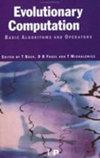Stagnation Detection with Randomized Local Search*
IF 3.4
2区 计算机科学
Q2 COMPUTER SCIENCE, ARTIFICIAL INTELLIGENCE
引用次数: 27
Abstract
Recently a mechanism called stagnation detection was proposed that automatically adjusts the mutation rate of evolutionary algorithms when they encounter local optima. The so-called SD-(1+1) EA introduced by Rajabi and Witt (2022) adds stagnation detection to the classical (1+1) EA with standard bit mutation. This algorithm flips each bit independently with some mutation rate, and stagnation detection raises the rate when the algorithm is likely to have encountered a local optimum. In this article, we investigate stagnation detection in the context of the k-bit flip operator of randomized local search that flips k bits chosen uniformly at random and let stagnation detection adjust the parameter k. We obtain improved runtime results compared with the SD-(1+1) EA amounting to a speedup of at least (1-o(1))2πm, where m is the so-called gap size, that is, the distance to the next improvement. Moreover, we propose additional schemes that prevent infinite optimization times even if the algorithm misses a working choice of k due to unlucky events. Finally, we present an example where standard bit mutation still outperforms the k-bit flip operator with stagnation detection.基于随机局部搜索的停滞检测*
最近提出了一种称为停滞检测的机制,当进化算法遇到局部最优时,它会自动调整突变率。Rajabi和Witt(2022)引入的所谓SD-(1+1) EA在具有标准位突变的经典(1+1)EA的基础上增加了停滞检测。该算法以一定的突变率独立翻转每个比特,当算法可能遇到局部最优时,停滞检测提高了速率。在本文中,我们研究了随机局部搜索的k位翻转算子的停滞检测,该算子随机选择k位均匀翻转,并让停滞检测调整参数k。与SD-(1+1) EA相比,我们获得了改进的运行结果,相当于至少(1-o(1))2πm,其中m是所谓的间隙大小,即到下一个改进的距离。此外,我们提出了额外的方案,即使算法由于不幸事件而错过k的工作选择,也可以防止无限的优化时间。最后,我们给出了一个例子,其中标准位突变仍然优于具有停滞检测的k位翻转算子。
本文章由计算机程序翻译,如有差异,请以英文原文为准。
求助全文
约1分钟内获得全文
求助全文
来源期刊

Evolutionary Computation
工程技术-计算机:理论方法
CiteScore
6.40
自引率
1.50%
发文量
20
审稿时长
3 months
期刊介绍:
Evolutionary Computation is a leading journal in its field. It provides an international forum for facilitating and enhancing the exchange of information among researchers involved in both the theoretical and practical aspects of computational systems drawing their inspiration from nature, with particular emphasis on evolutionary models of computation such as genetic algorithms, evolutionary strategies, classifier systems, evolutionary programming, and genetic programming. It welcomes articles from related fields such as swarm intelligence (e.g. Ant Colony Optimization and Particle Swarm Optimization), and other nature-inspired computation paradigms (e.g. Artificial Immune Systems). As well as publishing articles describing theoretical and/or experimental work, the journal also welcomes application-focused papers describing breakthrough results in an application domain or methodological papers where the specificities of the real-world problem led to significant algorithmic improvements that could possibly be generalized to other areas.
 求助内容:
求助内容: 应助结果提醒方式:
应助结果提醒方式:


